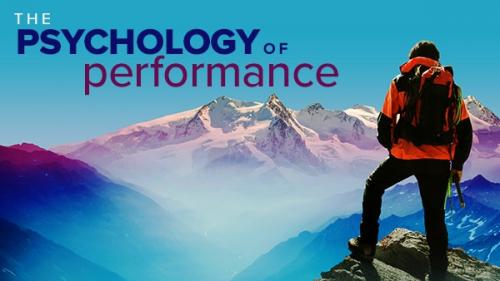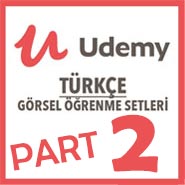TheGreatCoursesPlus - The Psychology of Performance: How to Be Your Best in Life
Learn how to use performance psychology and improve your mental, emotional, and physical game.
1: Sport and Performance Psychology
- Sport psychology uses psychological knowledge and skills to help athletes achieve optimal performance, while caring for their overall well-being and development. This lecture begins your introduction to a relatively new field, revealing the science behind the most appropriate cognitive and physical practices leading to top performance....
2: Deliberate Practice: Essential for Experts
- You say you don't have athletic talent? You'll be surprised to learn talent is overrated and can even become a disadvantage in the long run. Instead, discover the benefits of focusing your attention on practice-deliberate, purposeful practice with well-defined goals. That's the way to challenge your brain and body to grow and adapt to achieve expertise....
3: How Values and Goals Drive Performance
- If you want to reach your best performance level, you'll need to answer this one very important question: Why? Identifying what you want your performance life to be about will help determine your goals and values, and they will guide you through the hard work, wins, and losses ahead....
4: The Benefits of Mindfulness in Performance
- Performers in any sport or art must be aware, intentional, and purposeful in focus, attention, and action. While the application of mindfulness meditation to sports performance is in its infancy, initial scientific studies reveal both short- and long-term benefits. Learn about the three major models of mindfulness and how to best apply them to your practice and performance....
5: When Positive Thinking Doesn't Work
- We've all heard it: "Think positive! You can do it!" But when it comes to peak performance, is positive thinking a help or a hindrance? Cognitive defusion can help you see your thoughts for what they really are-experiences inside your head and nothing more. Gain the power of choosing which thoughts to follow and which to ignore....
6: Acceptance and the Willingness to Feel
- All human emotions are based upon these basic four: anger, fear, happiness, and sadness. So why should you expect to be happy and positive all the time? That's only one out of four! Learn to accept the full range of your thoughts and emotions in order to free up your energy to focus on your performance goals and values....
7: Commitment Means "No Matter What"
- If you want to achieve your peak performance potential, you know you must be committed. But committed to what? To the behaviors that lead to success. Will you prioritize commitment to your art, your sport, team, coach-or to the long-term goals and values you set for yourself? Learn how that choice affects your performance....
8: Finding Internal Motivation
- What keeps elite performers motivated, continually sacrificing so much for their art or sport? Although coaches and parents sometimes think they are in charge of motivation, self-determination theory says humans have an inherent need for three things: competence, relatedness, and autonomy-to be good, to have connections to other people, and to be in control of their own lives. Understand your intr...
9: Using Imagery to Prepare for Action
- Athletes and coaches have believed in the power of visualization and have used it in their practice for decades. Now, medical imaging reveals exactly how imagery impacts the brain and the body's nervous system. See how musculature, respiration, and circulation are all stimulated for the betterment of eventual performance when this mental rehearsal is used to its best advantage....
10: Confidence and Self-Talk
- Self-efficacy and sport confidence affect your ability to reach your practice and performance goals. But what are the sources of self-efficacy and how can you incorporate them into your life? Learn the ways in which instructional and motivational self-talk can work in your favor as a part of your training routine....
11: Developing Focused Attention
- Focused attention is the single most important psychological skill for all performers, whether executive or athlete. But is it possible for us to fully control our attention? And what can go wrong when we try? Learn why hyper-accessibility will inevitably lead to problems and how the five principles of effective concentration can improve your performance outcomes....
12: Superstitions, Rituals, and Routines
- What's the difference between an athlete's legitimate pre-performance ritual and a long-held superstition? Routines are always under the athlete's control and directly improve performance. Superstitions-which tend to be more prevalent among athletes the higher their achievement level and number of years played-include some magical thinking and are not directly helpful. So why are there so many sup...
13: Peak Performance: Getting in the Zone
- If you've ever stumbled into "the zone," you know you want to get there again. Also known as flow, the zone is that time when you're doing your sport, art, or job without thinking, just flowing from moment to moment, completely immersed. Learn how to prepare mentally and physically to increase your chances of entering this optimal performance state....
14: Performance Anxiety and Choking
- Anxiety is normal, and every performer is familiar with its physiological symptoms. But it does not have to negatively affect your performance. Learn about Quiet Eye training and how it can be applied in a variety of athletic or artistic situations. QE techniques can help draw internal attention away from anxiety and refocus attention on the critical physical actions of performance....
15: Being the Perfect Perfectionist
- Perfectionism is a paradox faced by almost all elite performers. It energizes achievement and contributes to success, but can also undermine performance and/or the enjoyment of success. Learn how to become a "perfect perfectionist," using its positive attributes to your benefit while avoiding the perfectionist's battle with feelings of shame and lack of self-worth....
16: Self-Compassion for Self-Improvement
- Athletes know all about boxing up their feelings in order to get tough, get the job done, and cope with crises. But research shows routinely taking time to acknowledge and process your feelings affects the psychological variables that improve performance. Learn how specific exercises can help you increase self-compassion and get results....
17: Burnout and the Need for Recovery
- The consequences of burnout can be devastating. Beginning with an exhaustion no amount of rest can relieve, burnout spirals downward through declining performance, frustration, decreasing motivation, and devaluation. Explore the underlying causes behind burnout, how to avoid and treat the problem, and the serious issue of burnout in today's youth sports....
18: Pain Tolerance and Injury Rehabilitation
- If you're an athlete striving for your highest performance level, pain and injury are just part of the game. But pain is never experienced in a vacuum. See how, for each athlete, pain exists within a unique bio-psycho-social context-the matrix that influences the athlete's individual relationship to pain and the choice of association or dissociation strategies for moving forward....
19: The Dangerous Pursuit of the Ideal Body
- Athletes can feel tremendous pressure to achieve the "ideal body" as early as elementary school. Consequently, although most of us recognize disordered eating and performance-enhancing drugs as problems, athletes can see them as short-term positives despite long-term damage. What does the latest research reveal regarding the health risks of methods many athletes use to improve sport performance?...
20: Fan Psychology, Identification, and Violence
- Teams need their fans, and fans need their teams. Uncover what the latest research says about the difference in the social and emotional health of higher- and lower-identified fans. Learn how being a fan can make you happy. Explore as well the risks and darker side of passionate fandom-not only does your level of identification affect your mood and enjoyment, but also your potential for anger and ...
21: Four Qualities of a Successful Team
- Learn how the four correlates of teamwork-cohesion, cooperation, role relationships, and leadership-function together to best enable sport teams to reach their goals. No matter whether you're in the world of sports or business, the Team Captain's Leadership Model will show you how to lead by example to better your team and yourself....
22: Talent: A Developmental Process
- Understand why the typical talent identification model works against the development of athletic talent in youngsters. Instead, turn to another model, the Developmental Model of Sports Participation, which research shows promotes the physical health and psychosocial development of all children involved in youth sport-in addition to most effectively promoting the development of specialized expertis...
23: How to Be a Great Sport Parent
- Whether parents want to help their children develop into successful achievers in sports, art, music, or life, it's important to remember that everything you say and do matters. Learn how to avoid the most common mistakes sports parents make-words and actions that work against your child's goals and your own-and what you can say that your child always needs to hear....
24: Aging Athletes: Competing and Retiring
- Learn what it takes to keep up skills and performance levels as we age. With appropriate planning, older athletes can often compete well beyond the age of peak performance and even remain competitive compared to their younger peers. But the time will eventually come to retire from your sport, and the sooner you start preparing for that transition, the better you will feel about it....

The.Psychology.of.Performance.How.to.Be.Your.Best.in.Life.part1.GC.rar
The.Psychology.of.Performance.How.to.Be.Your.Best.in.Life.part2.GC.rar
The.Psychology.of.Performance.How.to.Be.Your.Best.in.Life.part3.GC.rar

































